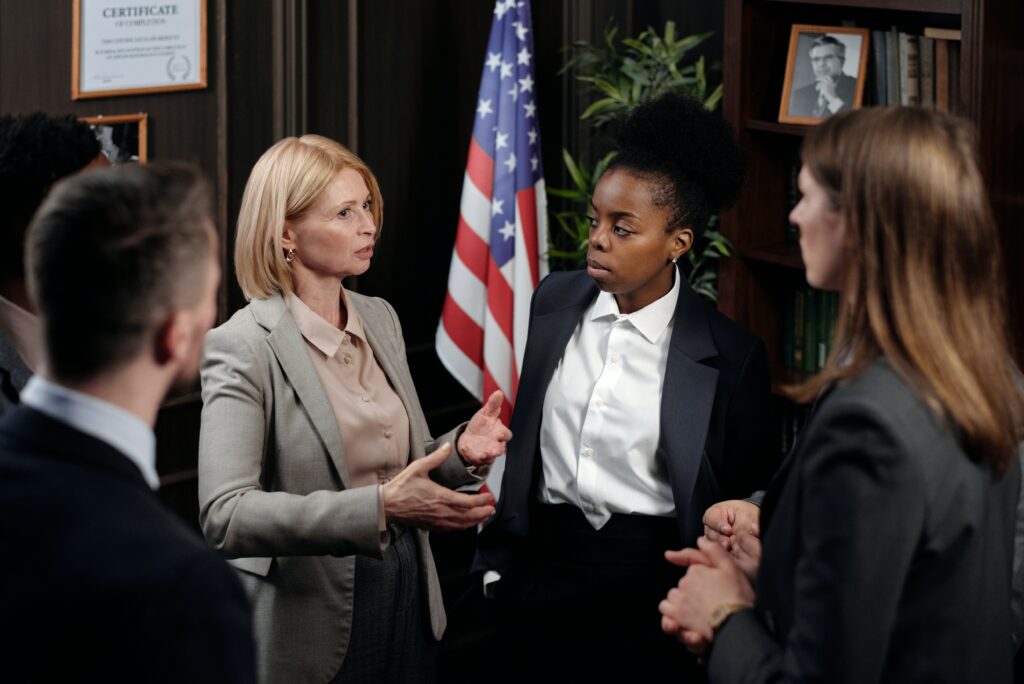The U.S. has grounded its identity in being one of the most inclusive democracies in the world. They employ federalism which separates the legislative, executive and judicial. These branches exist separately to provide checks and balances on each other. The use of pressure groups to influence one branch of government can undermine democracy in the United States. It is argued these groups can become too powerful, thereby removing the role of citizens and their representation. Citizens may vote for a politician to enact specific policies; however, with concerted pressure, they may be forced to act to benefit the group and its interests. When the overriding reason for the action taken by a pressure group only serves a few individuals, this group can be seen as undemocratic.
Pressure groups can often use radical methods to influence the government. These actions dominate much of the political conversation in the United States, often forcing lawmakers to take immediate action. Some pressure groups are directly endorsed by political players helping them to gain traction and attention. These groups bring about a heated social climate which causes discomfort among citizens. The government is forced to act quickly to reduce or end the discomfort. This result means that pressure groups are unelected superpowers. A war of wallets takes place to gain increased support for their cause. Some pressure groups are well funded to help get a message across to the government. When mass protests force the government’s hand, it leads people to question the influence of pressure groups on American lawmakers.
The definition of Pressure groups often refers to them as “non-profit”. The members who join these groups typically do so voluntarily because they support the cause of the movement. This feature is not always the case, as some pressure groups form a covert pillar of the American political system.

Political Endorsement
Interest groups should represent organizations and collective entities; however, when a political figure sponsors them, the cause can lose its neutrality. With a mysterious political sponsor, the promotional groups can be biased in their work to cater to individual citizens’ wishes. A pressure group member can be an insider; however, these are often non-governmental individuals. If a member of the pressure group is used as a proxy by a political figure, then the group loses its independence. Furthermore, with advice and direction from the political insiders, the nation no longer embodies the pluralism experienced by contemporary American societies. This problem leads to Americans suffering from predominantly elitist politics. Their votes are disregarded as a result of power and influence. The power and influence sponsored by wealth and status often cannot sustain worthy causes and good intentions.
For this reason, individuals argue that pressure groups in the U.S. significantly influence decisions. This form of organization undermines democracy and makes the political scene inaccessible to the general citizenry.
Holding Government Accountable
However, pressure groups having too much power can also be good, especially for a just cause. These groups’ main priority is influencing the government to promote a moral cause. When these groups stand up for the right reason, the majority will benefit from the new policy and legislation. The stronger a pressure group is, the better its ability to provide checks and balances on the government is. Without adequate representation, the views and issues of minorities may likely be excluded.
Plutocracy
Plutocracy is one of the main dangers associated with pressure groups. This term describes the relationship between wealth and influence. The more resources available to a pressure group, the more influence they can exert in all sectors of society. This power allows them to electioneer, i.e., sway the balance of congress or presidential elections. During elections, a pressure group can sponsor a candidate’s presidential campaign. This donation will often ‘buy’ them some influence over specific policies when their candidate is elected.
This power over elections is a significant part of why the pressure groups in the U.S. are considered highly influential. When officials of government are elected through the help of a pressure group, they get into office and work on suiting the views of their benefactors.
This problem is mainly applicable to pressure groups with significant resources. They are the groups with substantial power in the U.S. to influence laws. The less prominent pressure groups often cannot foster the political capital to control the actions of elected officials when in office. For this reason, some would argue not all pressure groups are too powerful in the country. This argument can mean they are less dangerous than wealthy groups.
When a group is formed to solve an immediate problem, e.g., building a road, it is unlikely they will foster enough capital to electioneer and donate money to candidates. These groups may fundraise; however, all funds will go to the administration of the issue they formed to handle. These groups do not hold much power but can apply pressure to achieve more minor policy changes in their community.
Wealthy insider pressure groups are often formed perpetual because of their prestige. These influential organizations often attract top professionals and politicians. Retired wealthy individuals often retire from their positions and join a pressure group to lobby the government from the outside. With a powerful pressure group supporting them, it can be the same as them never leaving the government. This is a revolving door for democracy as the retired professional or politician will often retire with numerous relationships with the politicians still serving in government offices. This advantage can undermine democracy as the retired elected official will still influence how they vote in congress when passing laws.






































